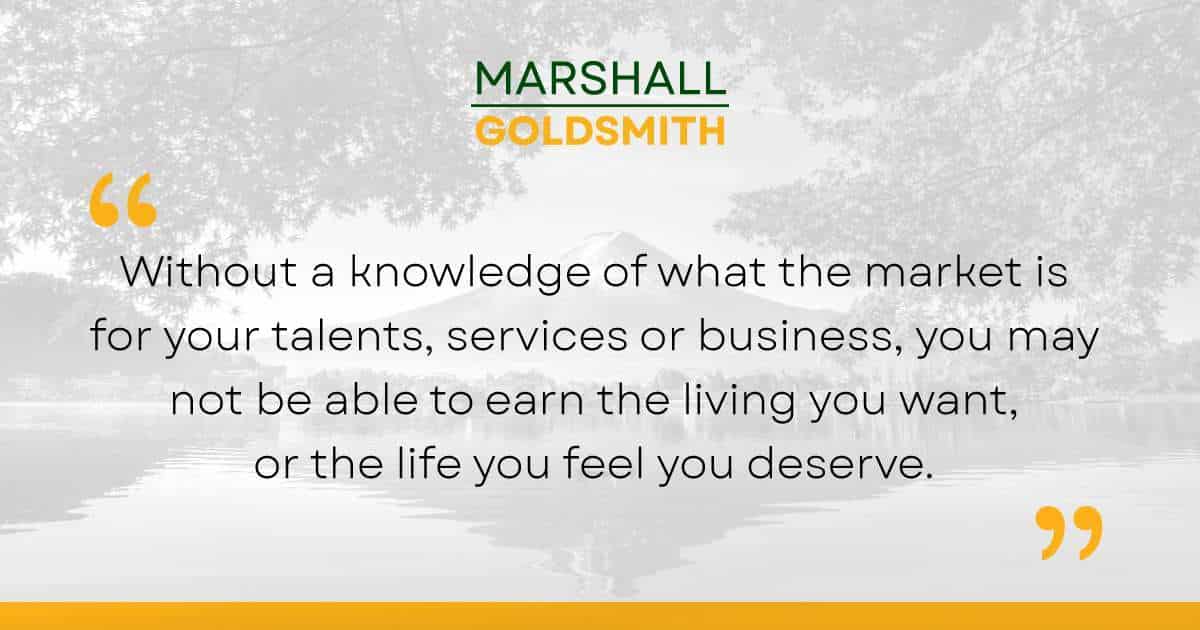Playing Favorites By Marshall Goldsmith There’s a reason I devote...
Just as ability is more than a gift, just as confidence is more than feeling good about achieving your goals, and just as understanding of others is more important than being up on all the latest news, so is the marketplace more important than simply having a great idea, a great product and great talent. Without a knowledge of what the market is for your talents, services or business, you may not be able to earn the living you want, or the life you feel you deserve.
This is something I’ve seen many times. In fact, I’ve seen it so often in families, it might be considered practically commonplace. A sister and brother may grow up in the same household, attend the same school system, and then have completely different career goals.
The sister wants to be a professional with an advanced degree, say, an engineer. The brother, no less focused or ambitious but preferring a dreamier, less well-charted path, bypasses the traditional college route for the life of, say, an artisanal knife maker.

The would-be engineer completes her education and enters a well-established albeit highly competitive industrial ecosystem for her skills. She glides into her career because a solid marketplace of manufacturers, high-tech companies, and design firms exist for her services. There’s always demand for engineers.
Not so for the knife maker. If the brother’s timing is off, he may begin his career at a moment when the market for his skills is overcrowded or is disrupted by some innovation. The marketplace that should have greeted him with open arms may be more unruly and vulnerable to changing consumer preferences than he imagined. It may even be vanishing in front of his eyes.
Two people from the same home who knew exactly the life they wanted to create for themselves. Two different outcomes, each depending on the marketplace for their skills.
It’s romantic to think that we can pursue our most ardent dreams without regard to earning a living.
The fact is, not only do the vast majority of us need to earn a living, if only to pay our bills and provide for our families, but, through rearing or inclination, most of us can’t help linking our sense of fulfillment and self-esteem to our material compensation. Unless we inherit wealth, it is only after we’ve accumulated enough in one career that we can afford the luxury of a new career in which money doesn’t matter. Anyone who relies on a paycheck knows this.
Yet every day thousands of Americans start up a business, or go back to school, or move to another part of the country, or quit their cushy job to strike out on their own—all hoping to improve their prospects for a fulfilling life—without asking the hard-nosed question: Is there a market for my product or service if I start up the business, or get my advanced degree, or move to a new town, or no longer work at a big company?
Years ago, one of my best friends made this mistake. He was earning a seven-figure salary as the top strategy expert at a powerful consulting firm, but he thought he could do better striking out on his own. Several of us in his support group warned him about the obvious risk in leaving a big firm, namely, that the credibility and prestigious client list that came with his position there would immediately shrink when he changed over to running his own shop. He didn’t believe us. Sadly, the marketplace rejected him. Clients he counted on to jump to him chose to stay with the big company. He never recovered.
If there is no market for what you’re offering (and you don’t happen to be the rare visionary who creates a new industry out of thin air), all your skill, confidence, and support will not overcome that hurdle.
As Yogi Berra said, “If the fans don’t want to come out to the ballpark, no one can stop them.”

Adding Too Much Value Won’t Get You There By Marshall...
C-Suite Master Class: No, But, However By Marshall Goldsmith Continuing...
The Doerr Institute: Expanding the Market for Coaches By Marshall...
Making Leadership Development Part of the College Degree at Rice...
Sanyin Siang – Winner of the Thinkers50 Marshall Goldsmith Coaching...
Thinkers50 Marshall Goldsmith Distinguished Achievement Award in Coaching – Nominees...
Leading with Influence: What Is Influence360°? By Marshall Goldsmith Founder...
Are You a Dominator, Manipulator, Persuader or Influencer? By Marshall...
Leading with Influence: Redefining Modern Influence Part 2 By Marshall...
My mission is simple. I want to help successful people achieve positive, lasting change and behavior; for themselves, their people, and their teams. I want to help you make your life a little better. With four decades of experience helping top CEOs and executives overcome limiting beliefs and behaviors to achieve greater success, I don’t do this for fame and accolades. I do this because I love helping people!
As an executive educator and coach, I help people understand how our beliefs and the environments we operate in can trigger negative behaviors. Through simple and practical advice, I help people achieve and sustain positive behavioral change.